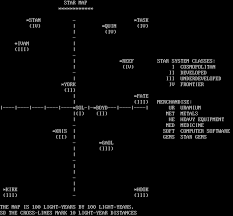Star Trader
type: simulation, manag./econ.
genre: Science Fiction, Trading simulation
setting: Future
perspective: other
player options: single player
languages: eng
genre: Science Fiction, Trading simulation
setting: Future
perspective: other
player options: single player
languages: eng
Description
A futuristic mercantile simulation. In the year 2070 the player must travel between colonized worlds with different levels of development to buy and sell goods with the aim of turning a profit. The player must haggle for the best prices. The galaxy slowly evolves as colonies grow more sophisticated and supply and demand of goods changes. Money can be put in the bank where the player can gain interest, but not all planets have banks to withdraw from.
The game features a world map of 10 by 10 light-years, centred around Sol. The planets further away have more raw resources and those closer by produce more advanced goods, but rely on raw resources, which is where the player comes in.
https://wiki.classictw.com/index.php/Star_Trader
 Becoro # 2024-01-07 13:50:29 - source
Becoro # 2024-01-07 13:50:29 - source
The game features a world map of 10 by 10 light-years, centred around Sol. The planets further away have more raw resources and those closer by produce more advanced goods, but rely on raw resources, which is where the player comes in.
https://wiki.classictw.com/index.php/Star_Trader
Technical specs
display: text
Editor note
This game has several a very notable feature for its day. One of which was having the choice a male of female captain and male and female crew members within a military setting. And, this had realistic effects within the society depicted (pros and cons depending on ratio or single-sex choice). Also, a valuable resource within the game was computer software. The design of the game necessitates that the computer software was bought and sold as source code as computer hardware was not (each planet created their own hardware to run the code). It might be unique for offering computer software/source code as a non-copyrighted commodity (as if it were like metal or uranium). The game was very much in keeping with the publisher's views on computers being a learning tool, used to improve social justice, and the importance of morality in computer use. PPC maintained the view that computer code should not be copyrighted. And all this was years before Net Neutrality and the Free Software Foundation. Among other things one might not expect is the issue of ownership of the captain's spacecraft, issues with unions, and illegal immigration. The code came with lists of suggestions for tweaking the game and adding features along with conciquencies. For instance, they suggest adding the ability of the captain and crew to engage in piracy (not of the software kind obviously) and implement penalties. Have competing superpowers (The captain and crew are from the game's single superpower planet). Politically and economically motivated embargos (and the evitable conflicts, that can include nuclear warfare). Ship-to-ship trading, and issues on what each planet's government thinks about that (ship-to-ship is tax free? Taxed, by who and how is that traced?). Implement ship durability and/or fuel efficiency along with the option of exceeding specs (top speed and fuel efficiency are static in the game, there is no reason to go any slower). The economy model of the game is Macro-economic with few fully developed members and many developing members growing and producing at different rates, a single merchant type that carries any inexhaustible resource. It is suggested to use a different economy model with various merchant types and exhaustible resources. The economy suggestions are the only ones accompanied by details about the actual code in need of change. The publisher asks players where pirates get their fuel (most games ignore such details, pirates are an economic factor in this game rather than a mere hazard).
 zerothis # 2014-09-10 11:56:13
zerothis # 2014-09-10 11:56:13
 zerothis # 2014-09-10 11:56:13
zerothis # 2014-09-10 11:56:13Authors / Staff
Tags (22)
historical
other
hardware
software
creatures
vehicles
locations
activities
game genre
Contributors (3)
teran01
zerothis
Becoro
zerothis
Becoro


 Post an anonymous comment / review about this game
Post an anonymous comment / review about this game